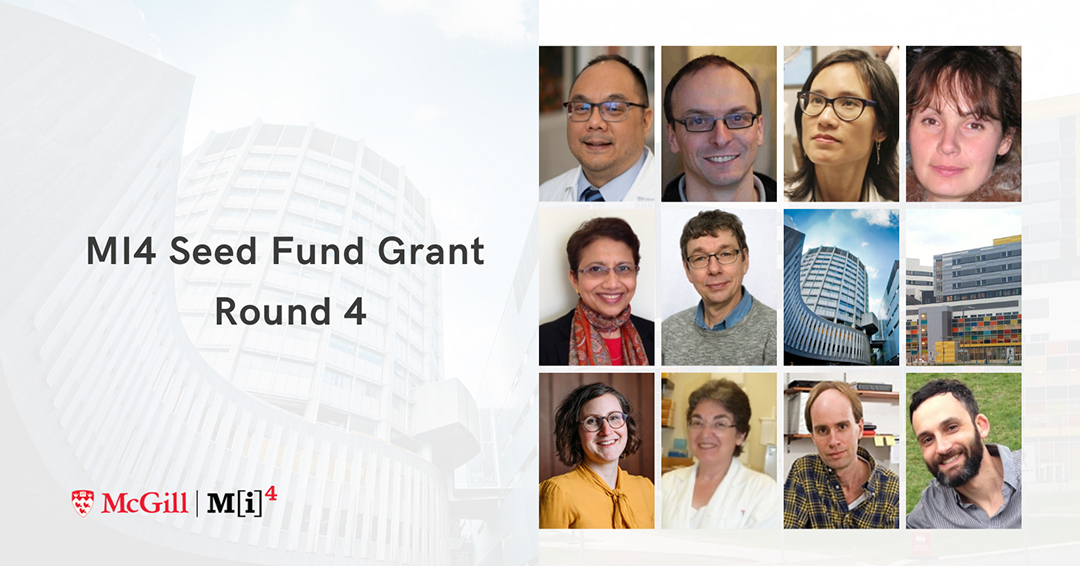
The McGill Interdisciplinary Initiative in Infection and Immunity (MI4) is pleased to award funding for five projects in the fourth round of its Seed Fund Grant (SFG) program.
The program supports innovative approaches that address the two broad MI4 thematic areas of infection and immunity. The proposed research must be interdisciplinary and the two co-PIs should represent different fields of expertise from two different institutions of the McGill ecosystem.
Sixteen applications were received, which were all reviewed by a panel of external experts.
The five successful teams each received a total of $150,000 ($75,000 per co-Principal Investigator).
“In the last four Seed Fund Grant rounds, MI4 allocated more than $4.2 million to support 28 projects through the competition. The results have already started to bear fruit, as detailed in our annual report,” said MI4 Interim Director Marcel Behr, Professor in the Department of Medicine.
Seed Fund Grant Round 4 Recipients
Donald Vinh, Scientist at the Research Institute of the McGill University Health Centre (RI-MUHC) and Associate Professor in the Department of Medicine, and David Juncker, Professor and Department Chair in the Department of Biomedical Engineering, will use the grant to combine the immunological experience of the Vinh lab with the bioengineering expertise of the Juncker lab to develop the prototype of a rapid COVID-19 test for Anti-Cytokine Auto-Antibodies in COVID-19 Patients.
“Thanks to the MI4 SFG, we will be able to repurpose our lab-on-a-chip technology for COVID-19 disease outcome prediction and take it outside of the lab and test it at the patient’s side,” said Professor Juncker.
Dao Nguyen, Scientist at the RI-MUHC and Associate Professor in the Department of Medicine, and Karine Auclair, Professor in the Department of Chemistry, propose a unique approach to antimicrobial discovery, by bringing together experts in the collection and cultivation of polar microorganisms, host-pathogen interactions, antimicrobial resistance, chemistry and drug discovery.
“With this funding, we expect to reach milestones that will position us in the antimicrobial discovery space with a novel and sustainable drug discovery pipeline. This will allow our team to find new partners and long-term funding sources,” said Professor Auclair.
Anie Philip, Senior Scientist at the RI-MUHC and Professor in the Department of Surgery, and Dieter Reinhardt, Professor in the Department of Anatomy and Cell Biology, received a grant to study scleroderma (systemic sclerosis), a chronic connective tissue disease characterized by fibrosis of the skin and internal organs.
Their previous work showed that soluble CD109 is a potent endogenous anti-fibrotic molecule and that mesenchymal stromal cells (MSCs) release substantial amounts of this protein. With the SFG, their main goal is to determine whether soluble CD109 released from MSCs can reduce fibrosis in SSc animal models and skin biopsies of SSc patients.
“Professor Reinhardt and I are excited to receive the MI4 SFG grant which will greatly benefit our collaborative research on determining whether CD109 released by mesenchymal stromal cells can reduce fibrosis in scleroderma. We expect that our research will form a basis for the development of novel therapies for scleroderma,” said Professor Philip.
Judith Mandl, Assistant Professor in the McGill University Department of Physiology and Joyce Rauch, Senior Scientist at the RI-MUHC and Professor in the Department of Medicine, work on a project, The impact of viral infection on the initiation and development of systemic lupus erythematosus (SLE) and seek to provide an understanding of how and when viral infections affect SLE.
The research has the potential to impact both knowledge about SLE and patient care. SLE is an autoimmune disorder affecting an estimated 4.4 in 100,000 Canadians that can result in life-long symptoms requiring chronic therapy and premature death.
“We are delighted to receive this seed money to start our new Rauch-Mandl lab collaboration that will give both our labs the chance to branch out into new territory. It will be exciting to start this project – we think it will give us important insight into the impact that viral infection has on the development and progression of the autoimmune disorder, systemic lupus erythematosus,” said Professor Mandl.
Michael Reed, Scientist at the RI-MUHC and Associate Professor in the Department of Medicine, and Jesse Shapiro, Associate Professor at the McGill University Department of Microbiology and Immunology, will take a multidisciplinary approach to tackle multidrug-resistant tuberculosis. The researchers’ work will pave the way for the development of novel “resistance-breaking” agents that can be added to the current drug-treatment regimens to restore antibiotic sensitivity.
The program offers a unique opportunity to extend the life and usability of the currently available first-line TB drugs which have, in many cases, lost their efficacy against drug-resistant TB.
“This SFG provides a tremendous opportunity to join together the complementary skills and strengths of our two research teams – namely molecular microbiology (Reed lab) and computational biology (Shapiro lab) – to build a multi-disciplinary project aimed at identifying novel approaches for tackling the global threat of multi-drug resistant tuberculosis (MDR-TB). Importantly, without the support and momentum gained from the visionary MI4 SFG program, this exciting new project may never have progressed beyond the initial concept and planning phases,” said Professor Reed.
The MI4 SFG Round 4 was made possible through the generosity of donors.
“We tremendously appreciate the contribution of our donors from the philanthropic community, such as the Doggone Foundation and the Rossy Family Foundation,” said MI4 Co-Director Marie Hudson, Associate Professor in the Department of Medicine.
About MI4
The McGill Interdisciplinary Initiative in Infection and Immunity (MI4), brings together a group of more than 200 scientists and researchers, with the goal of developing new solutions for infectious and immune diseases and delivering these solutions to the patients and populations who need them most.
For more info, please visit our MI4 Seed Fund Grant page.
